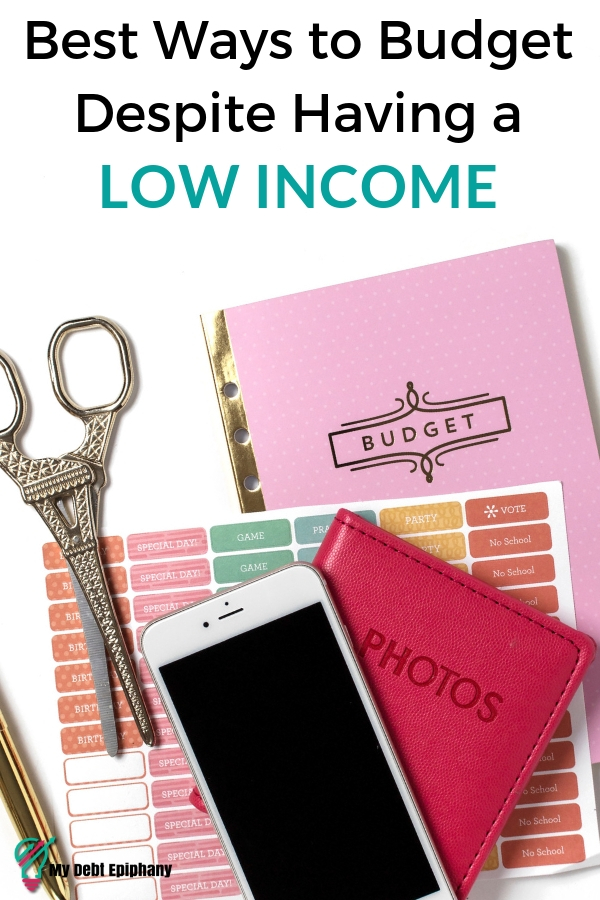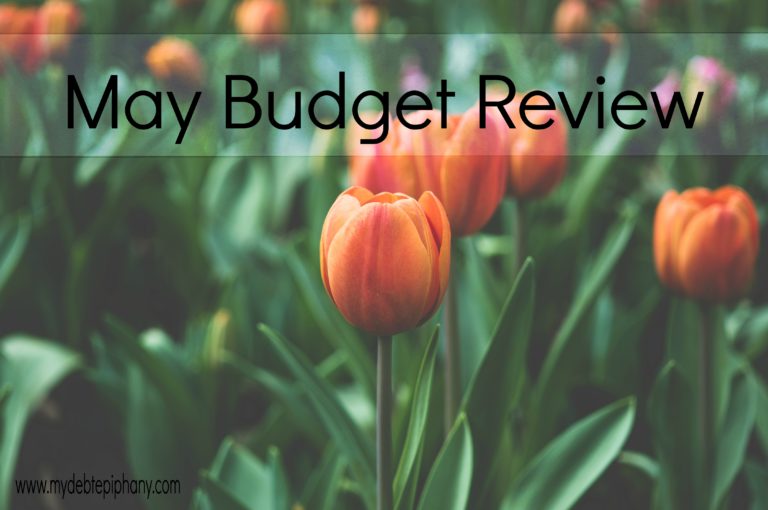Budgeting With a Low Income, Yes It’s Possible
Longtime readers of this blog know that my income hasn’t always been great. Even when I had a low income, I knew that budgeting was the answer if I wanted to get better with money and improve my situation.
Some people believe that budgeting is hard when you have a low income because there’s not much to go around and your budget limits what you can do which makes you feel even more deprived. This couldn’t be further from the truth.
Your budget doesn’t determine your current situation or keep you in a situation that you don’t like. It’s actually designed to do the opposite and empower you by helping you manage what you have wisely. That’s it.
If you feel limited, it’s not your budget’s fault. That said, you can definitely work on budgeting with a low income and I recommend it.
Here are some tips you can try to make budgeting easy and painless.
Table of Contents
Know Your Baseline When Budgeting With a Low Income
Do you know what your core, baseline expenses are? These are things like your rent or mortgage, food, transportation, etc. In other words, they’re expenses that you need in order to survive and get by comfortably each month.
Some people refer to these non-negotiable baseline expenses as a bare bones budget, but you can call it whatever you want so long as you do it.
It’s important to identify these expenses first you can ensure that you’re prioritizing them each month. Once you know you’re able to cover your baseline expenses without a doubt, you can slowly start to add in extra expenses so long as you can afford them.
So what do you do if you can’t afford your baseline expenses? I’ll explain some steps you can take later in this post.
Related: How to Come Up With a Bare Bones Budget
Minimize Your Biggest Expenses
The next thing you should consider doing is minimizing your biggest expenses. For most people, your largest monthly and annual expenses are things like housing, food, transportation and health insurance.
When I moved into my first apartment, my rent payment was only $590 per month. I shared a one-bedroom with my son and there were no other amenities aside from a laundry room on the property.
My apartment was super basic, but it was also cozy, safe, and affordable for my budget at the time. I probably could’ve gotten a nicer place with a roommate, but I didn’t mind living alone with my son for the time being. As you can see, I was perfectly fine with acting my wage which is something you must do if you’re trying to master the art of budgeting with a low income.
When my income was super low, I did qualify for food stamps so that helped us for a time. Once my income on paper no longer qualified me for this expense, I keep grocery costs low by shopping in bulk, buying seasonal produce, and cooking simple yet tasty meals that only required a few ingredients.
I taught myself how to be a better cook (YouTube recipe videos helped a ton) so I could eat a majority of my meals at home.
I drove an older $2,000 car that was good on gas and even used public transit sometimes when it was convenient. We used Liberty Healthshare for a time because it was much cheaper than the options at the marketplace.
Related: 50 Everyday Expenses You Need to Stop Spending Money On
4 Common Budgeting Mistakes You Need to Stop Making
Frugal Meal Ideas That Are Easy to Prep
Use an All Cash Budget
If your budgeting with a low income, one method I recommend using is the all-cash budgeting method. I currently use this method and I love it because it helps us avoid overspending, financial stress, and debt.
I actually use paper envelopes and label each one with a budget category I have. Whenever I get paid, I fill each envelope with cash according to the amount I’ve alotted with my written budget. THESE are my favorite cash envelopes currently if you’re looking for something long-lasting.
I spend as usual during the month but I’m more mindful of how I spend because I know that I want the cash I have to last. Sometimes, you can get strategic and borrow from one cash envelope if you need money for something else.
For example, let’s say you have an envelope for clothes or miscellaneous items. If you haven’t touched this money yet and the month is almost over, you can transfer it to your grocery budget envelop if you need it or even save the money instead.
Cash budgeting is great if you have a fixed income because it helps you avoid overspending with a debit or credit card. Essentially, you have to get creative and use only what you have which is a money management trait everyone should possess.
Related: How to Eat Well With a $700 Monthly Grocery Budget
The Ultimate Guide to Budgeting
Take Advantage of “Free” Money
When I say free money, I’m talking about tax returns, bonuses, and windfalls that you may or may not have been expecting.
While a tax refund is usually just money that you overpaid to the government during the previous year, low-income families can actually qualify for certain tax credits especially if you have kids.
When I used to get tax refunds, I’d often use the money to get a month ahead on my rent or to put toward debt or savings. This can also be referred to as windfalls too.
At my old 9-5, we had the opportunity to earn a $400 bonus each month if we hit a particular goal. This often motivated us to hit goal and I’d use my bonus money to add back to my budget. Even though the money wasn’t necessarily free, it was additional income outside my hourly pay so I’d use it to stretch our finances so things didn’t seem so tight.
‘Free money’ can also include apps and short task sites that pay you for little to no effort. Some examples are cash back programs like Rakuten, or earn free gift cards with Swagbucks. Swagbucks allows you to do short tasks online and earn points that can be redeemed for gift cards. You can earn free restaurant gift cards or even redeem one for a popular store you frequent so you can supplement the cost of your household goods and supplies each month.
This money can be used to supplement certain expenses that you have.
Related: 15+ Apps For Freebies
Rakuten (Ebates ) Review: Earn Cashback For Everyday Shopping

Start Making an Extra $100 Per Month
While all the tips I mentioned above will certainly help you, I want you to realize that budgeting with a low income does not have to be a long-term thing. Your household finances shouldn’t always be tight so you shouldn’t believe this is the norm. In fact, you can’t afford to think this way.
I don’t know what your personal situation is. Maybe your partner is in school and you’re temporarily living off one income. Perhaps you just had a baby and need to stay home. Maybe you got laid off from work and need or claim disability. Or, maybe you feel stuck at a job that just won’t pay you what you’re worth.
What I do know, is that we all have the opportunity to attract more money. I read a book called Secrets of The Millionaire Mind last year and the author brought up a super interesting concept.
He claimed that we all have a money blueprint which consists of information and programming that you’ve received during your life, especially during your childhood.
This blueprint can influence how you view money, your relationship with money, and how much you’re able to earn. I found it interesting when he said that certain people have set themselves up to never earn more than they are making currently due to their limited mindset and money blueprint.
So let me get to the point. You don’t want to allow your mindset or past experiences with money hold you back from attracting and making more.
You can make as much money as you want and don’t have to settle if you don’t want to. Once you’ve lowered expenses and cut your highest costs, the only other solution is to make more money.
You don’t have to come out of the gate earning thousands of dollars, however. Just commit to making an extra $100 per month to start. Anyone can do that. Also, think about how much that will help you. In my household, $100 will easily cover a bill.
Once you’ve hit that goal, raise it. Continue raising it until your income is where you want it to be.
Related: Side Hustles Explored: Simple, Low Effort Ways to Make Money
15 Side Income Ideas You Can Start (With No Special Skills)
What If You Can’t Afford Your Basic Expenses?
So you’ve identified your baseline expenses and checked to make sure you’re not overspending on certain expenses. Maybe you’re even using an all-cash budget as well.
However, despite your efforts, you’re still barely making ends meet and finances are tight. What you need to do is work on your source of income. You need to find a way to start bringing more money into the household. Here are a few solutions.
- Ask for a raise at work or a promotion – It doesn’t hurt to see what your options are
- Temporarily lower your 401(k) contributions at work so you can get a bigger paycheck – Investing in retirement is important, but if you can’t afford to live now, you certainly won’t be able to afford to live in the future so you need to tackle this problem first. At the moment, there is a cost-of-living crisis, even for those who are living well below their means. Inflation is rampant, rent is through the roof, it’s harder to get a loan, and even studies that Primerica has done only show that at the moment both the lower and middle class are struggling horribly. So you need to focus on today in order to have a better tomorrow (well, future).
- Apply for a better paying job
- See if you can qualify any temporary government assistance to fill in the gap whether it’s disability or medical assistance
- Establish a new stream of income – Check out this side hustle guide to get you started
Related: How To Get Your Spouse On Board With Budgeting
You have options, you just need to be willing to take action and understand that budgeting is not the enemy.
Have you ever had to budget with a low income? How are you making it work?


Stop Worrying About Money and Regain Control

Join 5,000+ others to get access to free printables to help you manage your monthly bills, reduce expenses, pay off debt, and more. Receive just two emails per month with exclusive content to help you on your journey.






